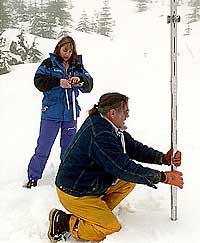forum
library
tutorial
contact

Snowpack Dependency Puts Northwest at Risk
Special to the Times by Sara PattonThe Seattle Times - January 10, 2003
|
the film forum library tutorial contact |

|
Snowpack Dependency Puts Northwest at RiskSpecial to the Times by Sara PattonThe Seattle Times - January 10, 2003 |
So there we were in December, sweating it out because weather forecasters said heavy snowfalls might not drop in the mountains this winter, and fearing for our precious supply of cheap hydroelectricity.
 Recent storms are but a small consolation — the Columbia River basin could still experience one of the drier seasons on record. If that happens, the Bonneville Power Administration, which sells electricity from the federal dams that generate almost half the power used in the Northwest, may be forced to raise its rates — again.
Recent storms are but a small consolation — the Columbia River basin could still experience one of the drier seasons on record. If that happens, the Bonneville Power Administration, which sells electricity from the federal dams that generate almost half the power used in the Northwest, may be forced to raise its rates — again.
Northwest ratepayers are still hurting from the high electric bills we got from the run of dry weather in 2001. And no one likes to remember the terrible fish kills caused when BPA sucked water it's supposed to reserve for salmon through hydro turbines instead.
It's quite a spectacle when you think about it — the inhabitants of our 21st-century civilization praying for water from the skies like Dust Bowl farmers. Yet, we continue to endure this nail-biting exercise every winter, hoping for enough precipitation to light homes, power factories, irrigate crops and transport fish.
It doesn't have to be this way. The Northwest has other energy options that can spare us this constant threat from drought.
This new year, BPA and the region's utilities should resolve to kick their harmful dependence on snow and take responsibility for securing a clean, affordable and dependable energy supply. The alternative resources — wind, geothermal, biomass and energy efficiency — are readily available. All that's needed is the willpower to seize the cure.
If the region clings to its desperate reliance on hydropower, the destructive cycle that forces fish, farmers, industry and consumers into a state of chronic conflict will only worsen. The rivers are stretched to the limit, and we can't make them give more. If anything, scientists tell us, the Columbia, Snake and other major rivers will change dramatically because of global warming. BPA's hydropower system is going to fail us again and again, leaving us at the mercy of power merchants whose prices will be far less charitable than BPA's.
BPA and the region's utilities must exert leadership to save us from another energy crisis. BPA has a strong record of delivering energy efficiency, and made a good start on renewable energy recently. The agency is considering new, long-term contracts with its customer utilities and must use the opportunity to establish joint commitments for delivering renewable energy and cost-effective efficiency.
But BPA needs support and encouragement to make the right choice. The agency listened to some bad advice over the past decade, causing it to abandon the resource-development efforts that would have spared us the painful rate hikes of 2001. It's time for BPA to present the facts boldly: Renewable power and energy efficiency are the best bet for cheap, reliable electricity over the long term.
A few months ago, the NW Energy Coalition released a study by the Tellus Institute showing that the Northwest is rich in clean, affordable energy resources. We estimate there's enough cost-competitive clean energy out there to meet the region's future demand more than twice over. What's more, the report showed that 3,000 average megawatts — enough juice to power three cities the size of Seattle — could be removed from the Northwest power grid through energy-saving technologies that cost less than new generation.
Investing in clean resources will prevent millions of tons of carbon dioxide and other pollutants from being pumped into the air by new natural-gas plants. We can build a new power system that both reduces our dependence on fossil fuels and helps us save salmon by reducing pressure on the hydroelectric system. And clean energy is a powerful economic-development tool because it invests in resources close to home.
In order to build the clean-energy future, BPA needs help from regional leaders, including progressive utilities, members of the Northwest Power Planning Council and clean-energy friends such as Gov. Gary Locke.
These leaders must champion clean energy as a real solution to the Northwest's worrisome obsession with snowpack. It boosts our economy (with wind farms and more efficient and competitive businesses), creates stable electric rates, makes water available for salmon, cleans our air and helps ward off global warming. We hope the region will take the message to heart and resolve to deliver a clean and affordable energy future for the Northwest.
learn more on topics covered in the film
see the video
read the script
learn the songs
discussion forum
